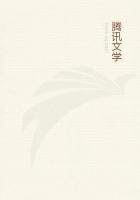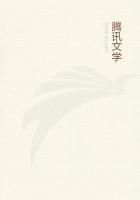A loud crash here announced that the door was broken down, and the knight just descended the stair in time to prevent bloodshed betwixt his attendants and the intruders.They were three in number.Their chief was tall, bony, and athletic; his spare and muscular frame, as well as the hardness of his features, marked the course of his life to have been fatiguing and perilous.The effect of his appearance was aggravated by his dress, which consisted of a jack or jacket, composed of thick buff leather, on which small plates of iron of a lozenge form were stitched, in such a manner as to overlap each other, and form a coat of mail, which swayed with every motion of the wearer's body.This defensive armour covered a doublet of coarse grey cloth, and the Borderer had a few half-rusted plates of steel on his shoulders, a two-edged sword, with a dagger hanging beside it, in a buff belt; a helmet, with a few iron bars, to cover the face instead of a visor, and a lance of tremendous and uncommon length, completed his appointments.The looks of the man were as wild and rude as his attire---his keen black eyes never rested one moment fixed upon a single object, but constantly traversed all around, as if they ever sought some danger to oppose, some plunder to seize, or some insult to revenge.
The latter seemed to be his present object, for, regardless of the dignified presence of Lord Lacy, he uttered the most incoherent threats against the owner of the house and his guests.
``We shall see---ay, marry shall we---if an English hound is to harbour and reset the Southrons here.Thank the Abbot of Melrose, and the good Knight of Coldingnow, that have so long kept me from your skirts.But those days are gone, by St.Mary, and you shall find it!''
It is probable the enraged Borderer would not have long continued to vent his rage in empty menaces, had not the entrance of the four yeomen, with their bows bent, convinced him that the force was not at this moment on his own side.
Lord Lacy now advanced towards him.``You intrude upon my privacy, soldier; withdraw yourself and your followers---there is peace betwixt our nations, or my servants should chastise thy presumption.''
``Such peace as ye give, such shall ye have,'' answered the moss-trooper, first pointing with his lance towards the burned village, and then almost instantly levelling it against Lord Lacy.The squire drew his sword, and severed at one blow the steel head from the truncheon of the spear.
``Arthur Fitzherbert,'' said the Baron, ``that stroke has deferred thy knighthood for one year---never must that squire wear the spurs, whose unbridled impetuosity can draw unbidden his sword in the presence of his master.Go hence, and think on what I have said.''
The squire left the chamber abashed.
``It were vain,'' continued Lord Lacy, ``to expect that courtesy from a mountain churl which even my own followers can forget.Yet, before thou drawest thy brand (for the intruder laid his hand upon the hilt of his sword), thou wilt do well to reflect that I came with a safe-conduct from thy king, and have no time to waste in brawls with such as thou.''
``From _my_ king---from my king!'' re-echoed the mountaineer.``I care not that rotten truncheon (striking the shattered spear furiously on the ground) for the King of Fife and Lothian.But Habby of Cessford will be here belive; and we shall soon know if he will permit an English churl to occupy his hostelrie.''
Having uttered these words, accompanied with a lowering glance from under his shaggy black eye-brows, he turned on his heel, and left the house with his two followers;---they mounted their horses, which they had tied to an outer fence, and vanished in an instant.
``Who is this discourteous ruffian?'' said Lord Lacy to the Franklin, who had stood in the most violent agitation during this whole scene.
``His name, noble lord, is Adam Kerr of the Moat, but he is commonly called by his companions the Black Rider of Cheviot.I fear, I fear, he comes hither for no good---but if the Lord of Cessford be near, he will not dare offer any unprovoked outrage.''
``I have heard of that chief,'' said the Baron---``let me know when he approaches, and do thou, Rodulph (to the eldest yeoman), keep a strict watch.Adelbert (to the page), attend to arm me.'' The page bowed, and the Baron withdrew to the chamber of the Lady Isabella, to explain the cause of the disturbance.
*******
No more of the proposed tale was ever written; but the author's purpose was, that it should turn upon a fine legend of superstition, which is current in the part of the Borders where he had his residence; where, in the reign of Alexander III.of Scotland, that renowned person Thomas of Hersildoune, called the Rhymer, actually flourished.This personage, the Merlin of Scotland, and to whom some of the adventures which the British bards assigned to Merlin Caledonius, or the Wild, have been transferred by tradition, was, as is well known, a magician, as well as a poet and prophet.He is alleged still to live in the land of Faery, and is expected to return at some great convulsion of society, in which he is to act a distinguished part---a tradition common to all nations, as the belief of the Mahomedans respecting their twelfth Imaum demonstrates.















